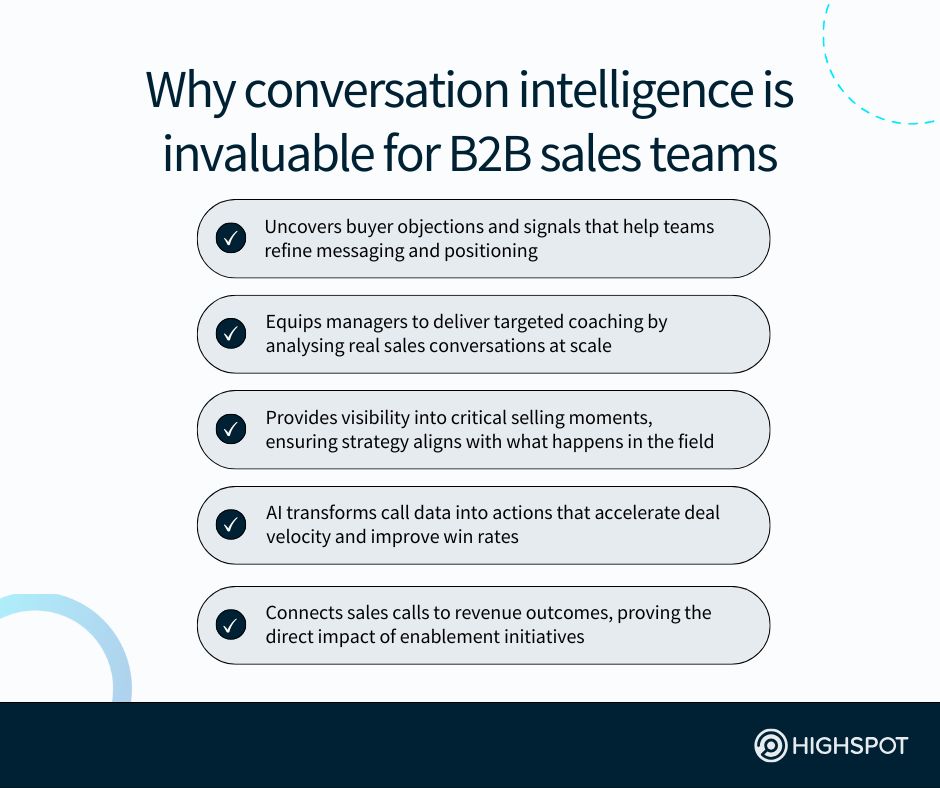Key Takeaways
- Conversation intelligence turns everyday sales calls into data-driven insights that improve strategy, coaching, and execution. It’s how leaders align reps and scale what works.
- The best platforms go beyond call recordings, using AI-powered analysis to surface critical moments and connect insights directly to sales playbooks, training, and outcomes.
- Highspot unifies conversation intelligence with content, training, and coaching so you and other busy sales managers and leaders can drive consistent performance and revenue growth.
Modern B2B sales isn’t just about knowing what to say to leads. It’s also about knowing when and how to say the ‘right’ message and why said approach works.
For sales teams like yours, that valuable insight isn’t derived from guesswork, but rather the daily conversations reps already have with potential customers.
Enter conversation intelligence: your lens into the truth of and context behind every interaction your reps have throughout the entire sales process. The real objections. The missed cues. The critical moments that made the deal—or didn’t.
What is conversation intelligence?
Conversation intelligence is software that captures, transcribes, and analyses B2B sales conversations using advanced AI. It helps sales teams extract data-driven insights from calls to improve performance, consistency, and strategy execution.
Applying conversation intelligence to your sales efforts involves more than just generating word clouds and customer sentiment analysis scores. It also entails getting a deeper understanding of day-to-day discussions with leads to learn what actually moves deals forward and getting that knowledge into reps’ hands.
Having a conversation intelligence tool is like having a smart coach for your sales reps—one that prevents sales leaders like you from having to dedicate even more 1:1 time with them to review and improve sales performance.
The increasingly popular conversation AI tech:
- Analyses speech and text interactions with AI and natural language processing (NLP)
- Helps sellers—even top performers—better pitch prospects during their sales calls
- Suggests next-best actions (lead follow-ups), and provides deal-specific guidance
Think of it as your always-on sales whisperer, tuned into every call, surfacing the gold, and helping your team sell smarter. Revenue leaders, meanwhile, can glean meaningful insights that can make all the difference in discovering what helps drive sustainable growth and what deters deals from crossing the finish line.
Conversation AI offered by sales enablement platforms such as Highspot helps GTM leaders swiftly collect data, detect successful selling patterns, and guide their sales teams accordingly using sales automation and key insights.
Example of conversation intelligence
Consider when one of your reps is on a call with a prospect:
- The lead expresses concerns about your product’s cost and compatibility with their current software solutions. Your conversation intelligence software can recognise these concerns by analysing sales calls and surfacing actionable insights related to the pushback.
- Specifically, the software can provide data and guidance on how to address the objections. This data is based on use cases from past experiences and may include evidence of cost savings from other customers or explaining seamless integrations with external systems.
- The conversational AI—depending on your tool of choice—may even present sales content cards that guide sales reps with the appropriate talking points: from answering discovery questions and handling objections, to relaying pricing specifics and competitive advantages.
After the call, the software can automatically update the CRM, highlighting objections and how they were addressed. It also provides automated insights tied to rep performance, as it relates to specific sales calls, indicating areas where the seller excelled and where they might need to up their games.
If a seller is dominating the discussion time, failing to touch on a prospect’s distinct pain points, not adequately addressing competitor mentions, or neglecting to bring up certain features and services of relevance to a lead, they can use AI-powered conversation intelligence tools to help them improve.
This rich sales call data can be used in sales training programmes to help boost team performance and empower reps to have more impactful customer interactions.
What’s more, your enablement, marketing, and sales teams can use conversation intelligence insights to inform content creation and messaging and positioning changes.
Call tracking software vs. conversation intelligence: What’s the difference?
While call tracking software concentrates on call recording data and metrics, conversational AI focuses on customer sentiment and understanding interactions. Both play pivotal roles in analysing customer communications but offer unique features.
- Call tracking software is designed to monitor and record phone calls. It supplies metrics like call duration, caller ID, and caller location. Additionally, it can provide rudimentary analytics such as call volume, missed calls, and conversion rates. The primary function of this software is to generate general call data, record call activity, and deliver transcripts for manual analysis.
- Conversation intelligence platforms and integrations offer more extensive insights into customer interactions across various channels: phone calls, emails, chatbots, and more. These tools leverage AI to transcribe, understand, and interpret the context of customer conversations, leading to actionable data tied to recent sales performance for your entire team.
This broader amount of detail and AI-driven analysis in the latter solution can significantly improve customer experience, seller performance, and overall business outcomes (not to mention make sales managers’ jobs and lives far simpler).
| Call tracking software | Conversation intelligence software |
|---|---|
| Records calls primarily for compliance and reference purposes only | Analyses each sales conversation to surface actionable performance insights |
| Provides basic metrics like duration, frequency, and call volume | Delivers AI-powered insights on tone, objections, and buying signals |
| Offers limited value for coaching or rep skill development | Equips managers to coach, train, and guide reps with precision |
| Operates as a standalone tool without deeper GTM integration | Integrates with CRM, content, and playbooks to drive execution |
| Focuses on tracking activity but rarely connects data to revenue | Links call insights to business outcomes and revenue growth |
Importance of conversational intelligence
With AI-powered conversation intelligence software, you can review post-call summaries from discussions your sales force has with prospects. By analysing calls, you can spot patterns and turn one-off wins into repeatable, scalable success.
Simply put, using conversation intelligence is how sales managers and leaders like you get a clearer view of what’s happening in the field so you can discover deeper insights into what influences closed-won and, in turn, revenue growth.
To leverage this technology, though, you need to invest in the right solution.
As Highspot SVP, AI Oliver Sharp noted, the best conversation intelligence software can “not only guide coaching conversations, but also … hold managers and reps accountable for landing the strategic initiatives that drive better revenue outcomes.”
It’s not about surveillance. It’s about support. And it’s not just for coaching under-performers. It’s also how top reps stay sharp and how new reps ramp fast. It’s how sales orgs get everyone aligned on the story, the strategy, and the execution.
Bottom line: Choosing the best conversation intelligence tool enables you to equip all go-to-market (GTM) teams with transcripts and talk-time stats and give them a way to grow, adapt, and act—and at the pace of your sales pipeline.

How conversation intelligence helps sales leaders and reps work and sell smarter
It’s clear AI-powered tools are transforming the way sales teams learn, adapt, and win. No longer stuck scrubbing through endless call recordings, you and other busy managers and leaders can capture the insights hiding in each and every sales conversation to unlock greater sales efficiency and productivity.
That means you can more capably (and quickly) sharpen your sales strategy, coach with purpose, and replicate what works.
As for your reps? It means less guessing, more knowing. The right cues, plays, and stories are recommended to them at the right times—just what your entire team needs to show up smarter, move faster, and close stronger.
In short, there are a number of advantages conversation intelligence tools afford your sales leaders and reps today—ones that enhance sellers’ productivity and lead to improved customer satisfaction for every prospect they engage.
Coaching insights can greatly boost sales rep productivity
Conversation intelligence software makes sales conversations more impactful.
Unlike traditional call recordings, which don’t provide immediate results, conversation intelligence tools provide real-time insights, propose specific content and context to reps, and automate administrative tasks, like updating CRM records.
This allows your reps to focus more on the most essential part of their job: selling. Equally as beneficial, it lets you refine your sales playbook and dashboards to streamline your sales processes and maximise efficiency and close deals quicker.
Personalise interactions based on customer conversations
Conversational intelligence helps B2B salespeople connect better with customers by paying attention to the granular details of conversations. Using call data insights enables reps to custom-tailor responses based on leads’ preferences and past interactions with key stakeholders at high-value accounts.
Whether it’s inside sales teams conducting Microsoft Teams calls with potential customers to account executives Zooming with C-level decision-makers in late-stage deal discussions, the goal is the same with conversation intelligence.
You must create an engaging experience that builds loyalty and converts new business. (Or, in the case of customer success teams, drives expansions and renewals.) And that’s where AI-powered conversation intelligence software helps.
Post-call analysis leads to more consistent deal-closing
Conversation intelligence platforms will use call recordings to pinpoint customer needs and challenges and suggest effective sales strategies based on machine learning algorithms. More importantly, they ensure important calls and meetings don’t spring surprises by providing notes, action items, and call summaries.
Salespeople can customise their messaging and overall selling approach and, in turn, proactively address risks and react to buying signals. By doing so, they increase their odds of closing deals (and appeasing revenue team leaders).
Rep onboarding, training, and coaching is more impactful
Artificial intelligence equips new reps with knowledge from past interactions. Presenting insights from successful calls accelerates their grasp of customer challenges and how to solve them. This allows sellers who join your staff to work with confidence as they ramp up, which then instills trust in leads.
Similarly, conversation intelligence tools help with sales coaching for veteran reps. Managers can lean on the artificial intelligence and machine learning capabilities of the solution to get customer insights from more deals faster and then use those insights to inform AI sales role plays.
This means they can share accelerated, instantaneous feedback on customer calls, not wait a few days to relay their comments and criticism to reps. Moreover, with AI analysing sales conversations on their behalf, they can set up their conversation intelligence solution to auto-share real-time guidance too.
Why your go-to-market teams should leverage conversation intelligence tools
Conversation intelligence doesn’t just substantially benefit your sales force. Multiple go-to-market teams within your organisation can also use the technology to help them perform their roles more effectively and make better-informed, data-driven decisions tied to various GTM and sales activities.
Optimise communication across all GTM teams
Conversation intelligence tools unite GTM teams around a single source of truth. By capturing insights from real buyer chats, it ensures marketing, enablement, and sales speak the same language. The result: sharper messaging, faster alignment, and collaboration that drives consistent execution from pitch to close.
Use customer sentiment to improve engagement
Conversation intelligence software can identify common issues or concerns by analysing conversations in a contact centre or customer support department.
This can then guide the customer service, customer success, and/or call centre reps in resolving problems and improving overall customer satisfaction. It can also assist in training new team members with successful interaction examples.
Maximise marketing strategies and campaigns
Conversation intelligence can enhance marketing team strategies by identifying target markets and customer preferences, enabling personalised marketing. It aids in customer segmentation and identifying pain points, helping adjust sales processes and improve the overall B2B buying journey.
Specifically, the technology measures campaign effectiveness, gauges customer sentiment, and predicts future campaign outcomes, assisting in programme optimisation.
Enhance the revenue team’s decision-making
By offering valuable, actionable insights, conversation and revenue intelligence helps business leaders steer their organisation more effectively toward its goals. It provides insights into staff performance, identifies product and people issues, and highlights gaps and customer needs. All of this helps leaders make sound decisions.
Help HR assess sales performance of new reps
Conversation data, like lead and customer feedback, can be valuable for human resources. It aids in evaluating agent performance and identifying high (and low) performers, guiding sales coaching and training. What’s more, it can detect disengaged reps and ensure compliance with policies and procedures.
Inform product development and enhancements
Insights from client engagement can provide the product team with direct feedback on what customers like or dislike about the product or what features they might need. This can help development teams make data-driven decisions for product enhancements or even inform the creation of new offerings.
Conversation intelligence FAQs, answered
Conversation intelligence works wonders for B2B sales teams.
Onboarding the advanced AI-powered tech to analyse customer calls for reps and managers and, in turn, elevate the quality of lead interactions and customer experiences is a proven means for leaders of revenue teams to drive growth.
But we know you still have questions about conversation intelligence and how it can fit into both your existing tech ecosystem and go-to-market strategy at large.
Here are answers to some frequently asked questions sales and revenue leaders often ask us about conversation intelligence and its role in their sales success.
What do the best conversation intelligence platforms offer?
The strongest conversation intelligence tools go beyond transcription. They capture call details, highlight critical moments, analyse buyer reactions, and deliver actionable insights for both reps and managers. The best solutions also integrate with GTM systems to connect call data to revenue impact.
Highspot leads here.
Our conversation intelligence doesn’t just record conversations. It also transforms them into insights, coaching opportunities, and actions tied directly to your GTM strategy, so every rep is aligned and every initiative can be measured.
How does conversation intelligence analyse reps’ sales calls?
The AI models in leading conversation intelligence solutions capture spoken words, tone, pacing, and buyer responses, then flag themes, objections, and opportunities using machine learning. This allows managers to quickly spot patterns in rep performance and align coaching to business priorities.
Highspot’s AI analysis goes deeper, surfacing insights that connect what’s said in the meeting with skills development, sales plays, and enablement initiatives. It’s intelligence in the flow of work, built to guide smarter selling at scale.
Can call data with leads be used to improve sales playbooks?
Yes, call data uncovers the objections, questions, and triggers buyers respond to most. That knowledge can be used to refine messaging, modify discovery questions, and add greater precision to and clearer guidance in sales playbooks.
Highspot makes this seamless. By linking conversation intelligence with Sales Plays, we ensure the latest lead insights are automatically reinforced in playbooks, so reps always show up with bespoke messages that resonate.
What is the top conversation intelligence software for sales?
The best conversation intelligence solution is one that doesn’t operate in a silo. Rather, it integrates call data with training, coaching, and enablement content, so sales intelligence turns into action, not just another dashboard.
That’s where Highspot stands apart.
Unlike point solutions, our unified GTM performance platform connects conversation intelligence to sales analytics, content, training, and coaching. This helps revenue teams scale what works and fix what doesn’t, faster.
How can recorded sales calls be used to better coach reps?
Call recordings let sales managers identify strengths, weaknesses, and patterns across the team. They provide concrete examples to reinforce coaching, making discussions with active opportunities more specific and actionable.
Highspot turns recordings into coaching fuel.
With meeting intelligence, AI-powered feedback, and skills frameworks, managers using Highspot can deliver precise, consistent sales coaching that builds lasting rep capabilities and skill sets and accelerates their performance.
Can we map sales call insights to skills framework training?
Yes, by analysing sales conversation data and mapping it to a skills framework, go-to-market leaders can tie what happens in calls to the competencies reps need to master, ensuring training is directly linked to real-world selling.
Highspot does this natively. We integrate conversation insights into sales skills and competencies, so enablement leaders can connect training, coaching, and call data in one system—building stronger, more consistent rep performance.
How should rep performance on sales calls be measured?
Look at more than talk ratios. Measure engagement, objection handling, message consistency, next steps, and how well reps align to the buyer’s needs. The goal is consistent, high-quality execution, not vanity metrics.
Highspot enables this with Rep and Team Scorecards, connecting conversation insights to competencies and business outcomes. It gives leaders a clear, objective lens to measure, coach, and scale top-performer behaviours.




